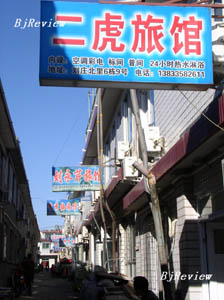
Anyone who has spent time in the People's Republic of China is obviously aware of the sheer number of hotels and sundry boardinghouses located in even the smallest city.
What patronizing Western travelers frequently encounter at the front desk, however, is a sudden expulsion by the proprietor conveying in Chinese that NO FOREIGNERS ARE ALLOWED!
What would compel a vacant guesthouse to turn away a paying guest into the night?
The answer is found in a longstanding police statute that prohibits the majority of these establishments from accepting non-Chinese guests or risk the penalty of a fine; only guests with Chinese identification may patron an independently run boardinghouse, called luguan.
Considering no Westerner could meet such a requirement, what this restrictive policy translates into is a concerted effort to urge foreign travelers to stay at more expensive, government-designated hotels.
Following the nation's accession into the World Trade Organization, metropolitan cities such as Beijing and Shanghai, along with the country's most popular holiday destinations, have eased their lodging restrictions to accommodate greater numbers of overseas tourists. But anyone intent on regional travel will be hard pressed to locate an appealing choice of legitimate budget accommodations outside the major cities.
Indeed, having passed through the most remote parts of China on my extensive journey across the country, this writer recalls spending many an uncomfortable night on a Chinese sidewalk or train station floor after being turned away from its only affordable lodging.
A strict budget prohibits me from frequenting any hotel with a room rate higher than 30 yuan, which dramatically reduces my chances of ever finding legitimate accommodations. One night in a three-star hotel is equivalent to a week's worth of frugal travel.
Lest one draw comparisons to myself with a stray dog, I might add that I'm not always so submissively destitute.
I vividly recall a recent experience in Yinchuan, capital of Ningxia Hui Autonomous Region in the northern interior. With only two accommodations to choose from in the immediate vicinity-an overpriced luxury tower or a simple guesthouse with dormitory-style rooms and a shared water closet-I of course sought the latter. As it was, the unapologetic front desk clerk would not admit me.
I looked and did not find the requisite posted official notice stating that foreigners were unwelcome; perhaps she was just intimidated by any interaction with a non-Chinese. I put up a good argument until a police officer was called to intervene. The officer summarily sided with the hotel.
In an act of good diplomacy, the kindly police officer not only escorted me to another hotel, but also paid my tab.
Grateful as I was, I pressed the police officer for an explanation of this policy of excluding overseas visitors from certain hotels. His only explanation was "Luguan are not safe for foreigners."
There may be some truth to this. The average boardinghouse, located in the less appealing neighborhoods that invariably surround transportation hubs, are dimly lit, unsanitary and inadequately constructed of mere particleboard. Nor are the typical luguan guests always the most upstanding of character.
Revenue generated by China's hospitality industry is annually estimated at 300 billion yuan, accounting for 2.5 percent of the country's burgeoning gross domestic product. The Beijing Olympics in 2008 and Shanghai's World Expo in 2010 are expected to make China the largest global tourism market in the next decade.
With between 50-100 million inbound tourists every year, those on business or of the affluent leisure set will be happy to spend 400 yuan and up per night on a branded mid-market hotel, which is still considerably less than in the West.
China's National Tourism Administration and adjunct agencies have heretofore been more concerned with revPAR (revenue per available room) growth than the ethics of forcing someone to either spend ridiculous sums of money for a bed or sleep in the streets.
Yet ultimately the administration will need to address the equally impressive number of budget-conscious travelers in the People's Republic-students and independent backpackers with a limited travel allowance intended to stretch from the Yellow Sea to the Himalayas.
Until the police lifts the overprotective policy of prohibiting them from patronizing the same affordable accommodations that Chinese nationals are entitled to, foreigners in China will be dissuaded from provincial travel upon the simple realization that there is nowhere affordably priced for them to sleep.
| 